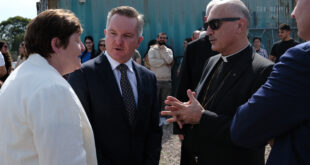A successful seminar on the humanitarian crisis in Iraq was held on Thursday 28th of August 2008 at Sydney University’s Footbridge Theatre. Organised as a joint initiative between the NSW Ecumenical Council and Sydney University’s Centre for Peace and Conflict Studies, the seminar brought together three experts who have seen first-hand the situation affecting the Iraqi people. The speakers were His Grace Bishop Mar Meelis Zaia AM of the Assyrian Church of the East, Ms. Donna Mulhearm who has worked with Human Shield in Iraq and the director of the Centre for Peace and Conflict Studies, Associate Professor Jake Lynch.
Focusing on the impact of the coalition-led intervention and its devastating consequences, the seminar also emphasised the actions that Australia and other governments need to take in order to address the humanitarian crisis they have inadvertently help to create. Current UN estimates report that over 4 million people have been directly affected, with 2 million internally displaced in Iraq and a further 2 million living as refugees in the surrounding countries such as Syria and Jordan.
His Grace Mar Meelis presented on the situation of the Christian Assyrians of Iraq and the efforts of the Assyrian Church of the East Relief Organisation (ACERO) to assist them through the provision of financial and humanitarian aid. Beginning with a brief history that described the ancient heritage of the Assyrians and the work of the Assyrian church since its inception in the first century AD, His Grace covered the plight of the small nation throughout the centuries up to its modern history since the late 19th century. Here, His Grace focused on the treatment of the Christian Assyrians that nearly saw their extinction by the end of WWI and the change of their status to that of aliens and refugees, with polices that suppressed their culture and identity. With this background, His Grace then provided information on the current situation, mentioning the kidnappings, church bombings, rape and other atrocities faced by the Assyrian Christians on a daily basis in Iraq as a consequence of the rise of sectarian violence since 2003.
His Grace also spoke extensively of the hardships faced by Assyrian refugees, including the lack of medical, educational and basic living needs in addition to their precarious residency status. A special note was made of the adverse affects on children, who as a result of being displaced both internally in Iraq and externally as refugees, are being deprived of an education, causing long-term problems. His Grace asserted that many families are only able to survive due to the efforts of charity organisations. The heartbreaking experience of a young Assyrian refugee woman living alone in Australia was mentioned; whose refugee family that had always lived together. This woman had remarked “Our family has become the United Nations,” in reference to her immediate family members, who now live in four different countries; an experience repeated for many thousands of Assyrian families.
His Grace asserted that it is the obligation of Australia, who has intervened as a military partner in Iraq and contributed to Iraq’s current instability, to increase its refugee intake. As the current policy stands, a Christian Assyrian has very little chance of being granted a refugee/humanitarian visa, as the resettlement program is assisting less than 1% of the entire population of refugees. The current Assyrian refugee population is estimated at between 300,000 to 500,000 and His Grace encouraged those who support humanitarian efforts to write to their local members of Parliament and encourage them to be active in addressing this urgent need for humanitarian aid and resettlement.
The next speaker, Ms. Donna Mulhearn spoke of her activism as Human Shield in Iraq and her humanitarian aid work. Ms Mulhearn stated that the international community is in a period of denial about the current humanitarian problems which are facing Iraq. She effectively outlined the atmosphere in Iraq prior to the invasion of coalition forces. Her speech focused on the living conditions that are facing Iraqis at the present moment. She displayed vivid photos of examples of Iraqis camping on sporting ovals, lack of access to clean water, living amongst rubbish heaps and the lack of hygiene. Sadly, she mentioned children now growing up in these circumstances consider such life as normal, in stark contrast to Iraqis’ richer material life prior to 2003. Ms Mulhearn also spoke about Iraqi refugees who are in Syria and Jordan, mentioning that with the current closure of boarders, displaced people now have more difficulty seeking refuge. As both Syria and Jordan have their own internal problems, the influx of Iraqi refugees only makes the situation all the more dire.
Ms Mulhearn emphasised that for Iraqis to call Iraq “home” once again, the country must become safe, requiring the assistance of governments and non-government organisations to address this very large humanitarian problem. Ms Mulhearn is former journalist, political adviser, and is now a writer and speaker on peace making and spirituality.
The final speaker, Associate Professor Jake Lynch, an experienced international media journalist who has covered conflicts in the Middle East, Europe and South East Asia, spoke on the manipulation of issues in media by governments to avert accountability and moderate public concerns. His speech discussed the hidden political problems around the world that are subsequently effecting the situation in Iraq.
The evening was thoroughly successful with three experienced and well informed speakers presenting an apt portrayal of the situation that is facing Iraqi people and the solutions needed to bring direct, effective and lasting assistance.
[nggallery id=38] Assyrian Church News Official News Site of the Holy Apostolic Catholic Assyrian Church of the East
Assyrian Church News Official News Site of the Holy Apostolic Catholic Assyrian Church of the East
